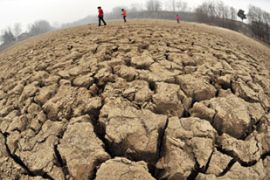Obama to pledge cuts in Copenhagen
US to commit to 17 per cent emissions cut from 2005 levels at climate summit next month.

“It’s critical that President Obama attends the climate change summit in Copenhagen,” he said.
“If he can deliver on his election campaign statements that Copenhagen needs to be a success by coming to Copenhagen himself, that I think will be critical to a good outcome.”
Most other world leaders have chosen to attend the last three days of the meeting, but Obama has timed his visit to coincide with the following day’s presentation of his Nobel peace prize in Oslo, the capital of Norway.
‘Encouraging signals’
De Boer said that there had been “encouraging signals” for the summit in recent days, including a revised pledge by Russia to restrict emissions to 25 per cent below 1990 levels by 2020.
The European Union is pushing for a commitment to a cut of 20 per cent, raising the target to 30 per cent in the event of an international agreement, while Japan has offered 25 per cent, but attached conditions.
“But still the aggregate pledges do not match up to the level indicated as necessary by science,” De Boer said. “There is no time to lose.”
| in depth | |
|
The UN Climate Panel said in a 2007 report that developed nations should cut emissions by between 25 and 40 per cent from 1990 levels by 2020 to avoid the worst of heatwaves, droughts, floods and rising sea levels.
Bekele Gelata, CEO of the International Federation of the Red Cross, said there seemed to be consensus among governments that something needs to be done.
“We ran a G20 survey, they unanimously agreed that climate change is a major humanitarian issue today,” he told Al Jazeera.
“We strongly agree government’s to come to an agreement in Copenhagen, which would obviously address both mitigation and adaptation, because climate change is today not tomorrow.”
Gelata said that Obama’s decision to attend was “good, as leadership is needed to come to terms, to reach an agreement”.
US commitment
The 17 per cent commitment made by the White House on Wednesday matches a reduction target in a climate bill passed by the US House of Representatives, while the version of the legislation to be debated in the senate version aims for a 20 per cent cut from 2005 levels.
India, China and other developing nations have been pressing for developed nations to offer technology and other support to help them reduce the intensity of emissions blamed for global warming.
But the emerging economies have also resisted legally binding requirements, saying that wealthy nations, not them, bear the historic responsibility for carbon emissions.
Earlier on Wednesday, China said it would not sacrifice its economic growth to meet emissions targets.
“When a nation is in a period of fast-paced industrialisation and urbanisation, energy consumption and total emissions go up rapidly,” Yu Qingtai, China’s envoy to the summit, said.
Yu also accused developed nations of failing to fulfil pledges under the Kyoto Protocol, which is meant to be replaced by a new deal in Denmark.
